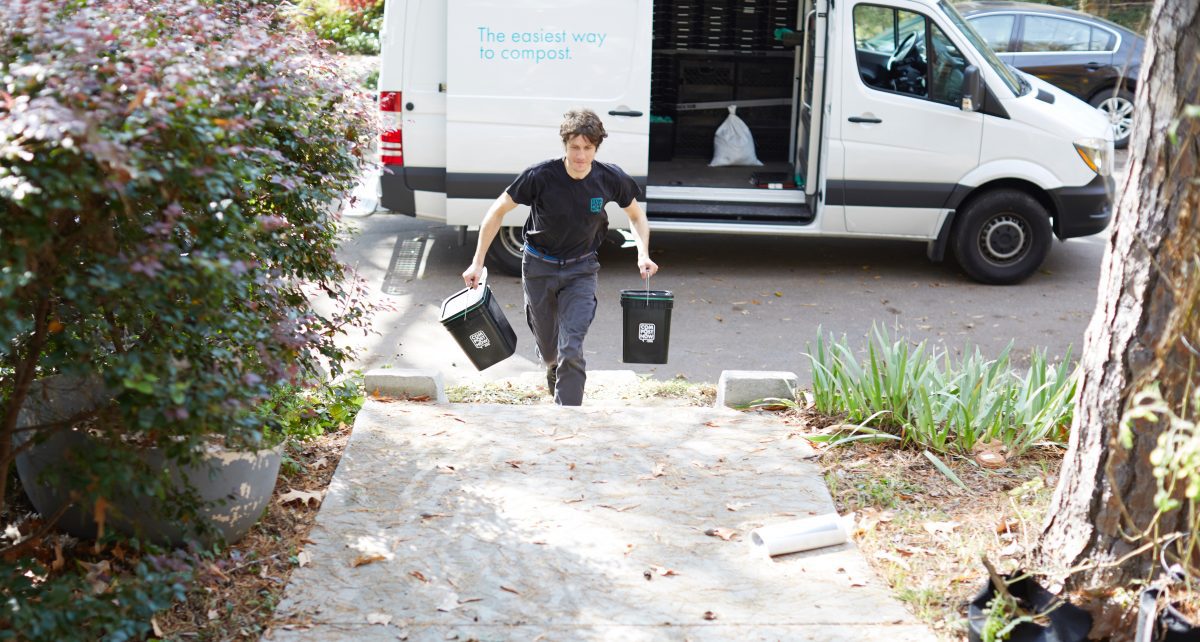Residents of the city of Durham recently received a survey about a sexy topic: food waste and composting.
Composting can sometimes seem like the province of hippies and/or actual farmers, but Durham’s current strategic plan calls for the city to evaluate ways to increase residential composting. The compost survey, which will be open to residents until the end of May, is the first step in that process. Muriel Williman, the senior assistant manager with the City’s Solid Waste Management Department, is leading that effort.
“We want to take the temperature of our city—compost humor—to see what type of services would really work. Would people be willing to pay for it? Can we do a subscription-based program? And so on,” Williman said. “The pilot will be designed, hopefully, to construct a program that is accessible and that works.”
Looking through my own kitchen trash can, to the distress of my roommates, revealed that food waste makes up about a fifth of our apartment’s trash: eggshells, fruit peels, asparagus stems, avocado skins and pits, piles of coffee grounds, and a decaying bunch of aspirational cilantro could all be sent to a composting facility instead.
For Durham, that’s a pretty typical breakdown of household waste. A 2015 city “Waste Characterization Study” found that around 30 percent of Durham residential trash sent to landfills is “food and soiled paper,” both of which could be composted instead. If food waste were its own country, it would be the third largest emitter of greenhouse gases, after China and the U.S., according to the United Nations. Most food waste in the U.S. occurs at the consumer level, rather than during food harvest, processing, or even sales.
Durham waste management’s goal is to reduce the weight of city garbage by 10 percent within three years. After reducing the amount of trash we produce in the first place, compost and recycling are the two most obvious options.
The city government isn’t alone. A growing number of local people are already composting, either in their backyard or using a service. CompostNow, a Raleigh-based community composting company, serves more than 2,600 Triangle residents, up from 639 members in 2017, according to Kat Nigro, who is the company’s head of marketing and engagement. (She previously worked at Tilthy Rich, a bicycle-focused composter that CompostNow bought in 2018.)
“I think composting is stepping out from the shadows of something your grandfather did or something crazy hippies do, and now it’s kind of stepping into mainstream culture. I think it’s having its moment right now,” Nigro said. “Our members are really vocal about the value of composting and they are not afraid to share it with their neighbors or their school, or get their office on board, and it’s been really amazing to see.”
CompostNow has diverted a little more than 4,000 tons of Triangle trash from landfills since 2011, but according to WRAL, Durham County produced 285,477 tons of waste in 2015, with a population of 297,219 people. In other words, we each produced approximately ten times our own weight in trash. But of course, not everyone produces the same amount of trash.
“The people who are contributing to climate change the most are the more privileged affluent communities, but unfortunately the people who are going to feel the effects of climate change first are going to be the lower-income communities. So that discrepancy is obviously on my mind,” Nigro said. “Some people look at us and say, ‘You guys charge for the service?’ and we say, yes, we have to charge for the service because of where we’re at with waste management right now. it’s still cheaper to throw away things, that’s the bottom line.”
CompostNow costs around $29 per month for weekly pickup. But in Durham, trash pickup is paid for by taxes and has no additional fee, though residents can pay $7.50 a month for weekly yard-waste pickup. It’s those customers who would most likely be targeted by the pilot program, Williman said. Of the 20,000 current subscribers, about 10 percent might have the opportunity to also add their food waste as as a test of potential curbside compost collection.
Williman hopes to design a program which is not only functional but accessible to all residents. The composting survey is offered in English and Spanish to help reach different communities in the city.
“We want to make sure this program is accessible to people that come from different demographics—maybe English is not their first language, maybe they’ve never composted before, maybe they’re in a lower economic bracket than someone with a college education who has property and has been composting forever,” Williman said.
Durham has more eco-friendly options for residents than just about anywhere else in the state, and Mayor Steve Schewel’s campaign website even included an entire page about his position and priorities on waste management, which includes the improbable sentence, “Steve believes we can find opportunities in trash.” According to Matt Kopac, chair of the Durham City-County Environmental Affairs Board, Schewel as a city councilman spearheaded the 2015 waste characterization study, which was the first time the city had real data on the breakdown of waste in the community.
“I would definitely describe Durham as a sustainability-focused city. In addition to being a city that advocates for environmental justice, there is palpable action around issues concerning social and racial equity and inclusive growth,” Dr. Cristian Roberto Valle Kinloch, a member of the Durham City-County Environmental Affairs Board, wrote in an email.
On a practical level, Durham already has a state permit to compost yard waste and biosolids—also known as treated sewage—from the waste-water treatment facility. That project has been delayed some due to the unusually rainy winter, Williman said.
“This is a system we want to get right,” Williman said. “Once [the city’s contractors] have that well in hand and it’s operating perfectly as permitted—and that includes reaching temperatures that are necessary to kill pathogens—once they have that straight with the biosolids and the yard waste, they’ll be able to add food waste.”
In addition to fertilizing depleted urban soil, composting can also slow down the rate at which landfills are used up. Durham’s landfill closed in 1998, and the land can never be used for anything else. The city now sends its solid waste to a landfill in Sampson County, east of Fayetteville, where decomposing food produces methane, a greenhouse gas.

“It’s a waste of a valuable resource, it’s a waste of money,” Kopac said. “So not only are we not harvesting these organic materials to be turned into compost to help enrich our soil, we’re also paying money to ship and throw away this valuable resource, so it’s sort of a double loss. so I think the city’s move toward having more residential composting is important and powerful.”
Even without the city’s composting service in place, residents who are willing to pay extra to lower their carbon footprint have a range of private-sector options. There’s Fillaree, which offers refillable glass and aluminum containers of toiletries and dish soap; GreenToGo, a service which lets Durhamites get reusable to-go boxes at participating restaurants; and Ungraded Produce, a produce delivery service founded by two Duke students that sends subscribers boxes of aesthetically imperfect fruits and vegetables which might have otherwise gone to waste. Advocates view this market as evidence that Durham is primed to compost more.
“I don’t think something like Tilthy Rich could have done as well as it did in any other place at that time,” Nigro said. “Durham was so special, and I just think back to the year 2016. The next year we doubled our membership, and that could have only happened in a place like Durham where a lot of us have that collective mindset of protecting this community and protecting our natural resources.”
Images of Brooks composting facility, the site CompostNow uses, reveals that the operation is basically a dirt lot in Goldston filled with orderly long piles of compost-to-be, which Nigro said are usually eight feet high. The temperature of each pile can reach 160 degrees due to the exertions of worms, mites, fungi, and bacteria, and as a result, the process from trash to humus takes only three months. Backyard composting, Nigro said, can take six to eight months.
The city currently provides a 25-page guide to composting at home, which is helpful because there’s more to composting than just putting all your biodegradable trash into a pile in the yard. Good composting—the kind that produces usable fertilizer and limited amounts of methane gas—requires frequent turning and a relatively consistent balance of different types of waste. It’s easier, and cheaper, to send food scraps, like the rest of our trash, to a landfill. Because of that, Nigro says, CompostNow isn’t worried about the competition from a possible municipal government program.
“We do not care how people compost—if it’s in their backyard, using a drop-off service, a municipality service, our service,” Nigro said. “For us it doesn’t matter, we just want people to be composting. Food waste is huge. This is a huge problem to tackle, and there’s enough of it that it’s going to take so many different people, so many different players in this game. So we don’t shy away from that, and we don’t want to discourage the city in any capacity because we believe there’s enough of it to go around.”
(Photo at top by Bailey Garrot)





Comments are closed.